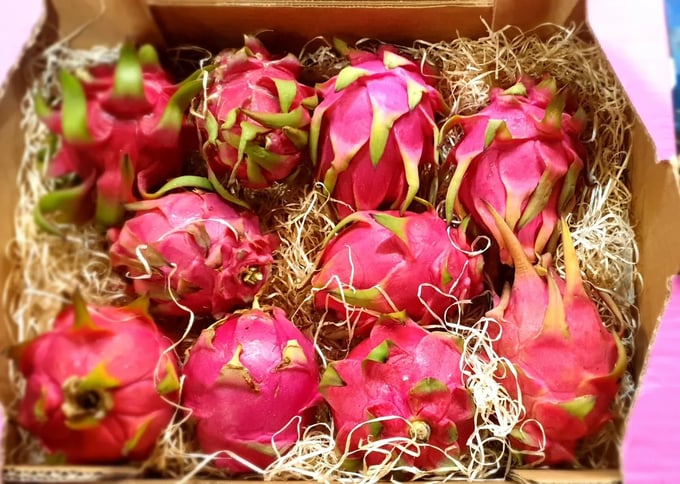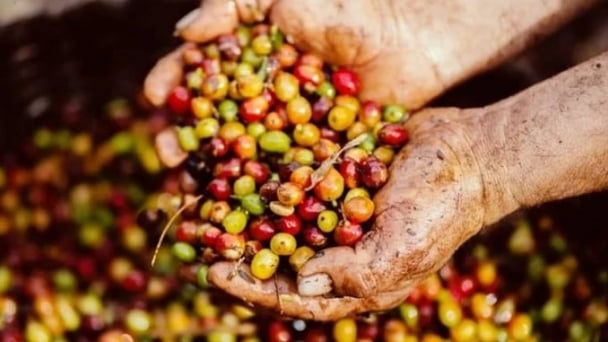June 17, 2025 | 14:12 GMT +7
June 17, 2025 | 14:12 GMT +7
Hotline: 0913.378.918
June 17, 2025 | 14:12 GMT +7
Hotline: 0913.378.918

A 400-gram Vietnamese dragon fruit can be sold for 150,000 to 200,000 VND in the UK.
The UK government made an announcement on July 11 pertaining to the review and draft amendments to Regulation 2019/2023 on temporary increases in official and emergency control measures for select imported goods, including dragon fruit products from Vietnam.
Accordingly, the UK moved dragon fruit inspection from Appendix 2 - List of food products subject to control at source, carried out in the exporting country (also known as export with certificate) to Appendix 1 - List of food products not subject to control at source, inspection is carried out at the importing country's border gate.
On the other hand, the UK aims to increase the frequency of inspection, which includes sampling, analysis of food safety indicators, etc., from 20% to 50% at its border gate.
Immediately after receiving this notice, the Department of Plant Protection compiled dragon fruit export inspection data at border gates and reviewed dragon fruit warning information for the EU and UK markets.
Based on review and evaluation, the Department of Plant Protection found that the UK's motion to move Vietnamese dragon fruit from Appendix 2 to Appendix 1 is a reduction in inspection level.
In an interview with the Vietnam Agriculture Newspaper, a representative from the Department of Plant Protection explained that these changes are the UK's regular and periodic review of food safety inspections for goods imported from other countries. Furthermore, the recently announced content is at a drafting stage.
"The UK's proposal to move dragon fruit to Appendix 1 demonstrates that they now regard Vietnam's food safety control more favorably than they previously did", emphasized the representative from the Department of Plant Protection.
However, this proposal also increases the inspection frequency at border gates to 50%, instead of the standard 20% in other EU countries. This will have a more significant impact on the reputation of Vietnamese dragon fruit products than the control measures at the source. Furthermore, it will increase the inspection and warehousing costs for local export businesses.
In response to this news, the Department of Plant Protection sent Official Dispatch No. 1892/BVTV-ATTP dated July 26 to the Food Standards Agency and Food Standards Scotland (FSA and FSS). Accordingly, the Department requested the UK government to maintain food safety control measures for Vietnamese dragon fruit at its current level. In addition, the Department has requested the UK to provide evidence and frequency of risk warnings for Vietnamese dragon fruit shipments.
"The Department is ready to study the risk assessment documents sent from the UK and Scotland regarding the changes in food safety inspection method applied to Vietnamese dragon fruits. Subsequently, we will promptly provide the UK with a response", the Department of Plant Protection emphasized.
While waiting for feedback and further information from other parties, the Department of Plant Protection recommends local businesses and individuals to thoroughly manage records and documents on sanitary and phytosanitary for dragon fruit shipments in advance. When these businesses export to the US, they must ensure strict compliance with the UK's import regulations.
The Department of Plant Protection encourages agricultural producers to perform effective control of production areas, with full implementation of monitoring measures as well as ensuring sanitary and phytosanitary requirements.
The Department suggests agricultural exporters accurately implement regulations imposed by the UK and the EU on Vietnamese dragon fruit, as well as related issues in the UKVFTA and EVFTA Agreements.
The Department of Plant Protection is committed to providing sufficient evidence, scientific data and legal basis related to the UK government so that they can apply appropriate regulations to Vietnamese dragon fruits.
The Department of Plant Protection requests news organizations and newspapers to coordinate closely and report accurate news, preventing misunderstandings that can harm the reputation and quality of Vietnamese agricultural products because exports of Vietnamese dragon fruit to the UK will continue to follow current regulations.
Vietnamese dragon fruit has consistently yielded the highest fruit export turnover within ten consecutive years. However, the export value of this product has shown signs of decline since 2022, giving way to durian. According to the General Department of Customs, Vietnam's dragon fruit export turnover reached over 630 million USD in 2022. However, this figure has shown signs of steady decline in the first six months of 2023.
Translated by Nguyen Hai Long
![Turning wind and rain into action: [5] Hue applies modern technology in disaster forecasting](https://t.ex-cdn.com/nongnghiepmoitruong.vn/608w/files/news/2025/06/17/z6704423696987_15fd32ffc26d590d204d520c9dac6786-nongnghiep-093938.jpg)
(VAN) In Hue city, modern technology has recently been applied in meteorological and hydrological forecasting and warning, helping to reduce the damage caused by natural disasters.

(VAN) A cutting-edge farming technique being implemented on an experimental ranch in Arizona's Sonoran Desert has already saved a billion gallons of water over five years, according to Civil Eats.

(VAN) Poultry and pig production and the environment can be boosted through enhanced water technology, according to new research.

(VAN) Coffee prices on June 16, 2025 are unchanged. In Vietnam, local trading prices are holding steady, ranging around VND 112,000 – VND 112,500/kg.
![Turning wind and rain into action: [4] Bringing climate bulletins to remote and isolated areas](https://t.ex-cdn.com/nongnghiepmoitruong.vn/608w/files/linhnhp/2025/06/14/1152-z6704423696987_15fd32ffc26d590d204d520c9dac6786-nongnghiep-151141.jpg)
(VAN) The Vietnam Agriculture and Nature Newspaper interviewed Mr. Vu Thai Truong, Acting Head of Climate Change and Environment at UNDP Vietnam, to gain deeper insight into how climate bulletins are delivered to farmers.

(VAN) In Tien Giang, a high-tech shrimp farm has developed a distinctive energy-saving farming model that has yielded promising results.
![Turning wind and rain into action: [3] 300.000 farmers benefit from agro-climatic bulletins](https://t.ex-cdn.com/nongnghiepmoitruong.vn/608w/files/news/2025/06/12/e5a48259d6a262fc3bb3-nongnghiep-125122.jpg)
(VAN) The agro-climatic bulletin has become a valuable tool for farmers in the Mekong Delta. After more than five years of implementation, the initiative is gradually being expanded nationwide.